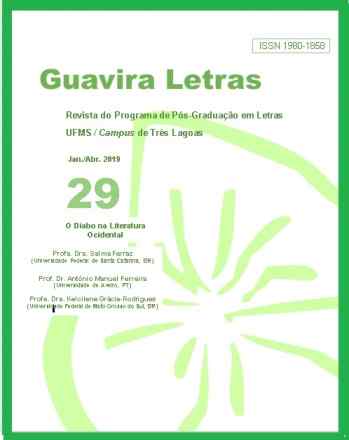VIOLÊNCIA CONGÊNITA: A REALIDADE REPRESENTADA POR NOVOS ESCRITORES BRASILEIROS
Guavira Letras
VIOLÊNCIA CONGÊNITA: A REALIDADE REPRESENTADA POR NOVOS ESCRITORES BRASILEIROS
Autor Correspondente: M. F. Correa, C. Z. Cortez | [email protected]
Palavras-chave: literariedade, violência, literatura brasileira contemporânea
Resumos Cadastrados
Resumo Português:
A ficção brasileira contemporânea apresenta maneiras diversas de representações da manifestação e da configuração da violência na vida social. O mundo, segundo Pierre Lévy (1997), está submerso em um oceano infinito de informações e plataformas de acesso, diminuindo distâncias e encurtando caminhos, colocando os textos praticamente na mesma estante. Ciente da nova situação e com vistas ao estabelecimento de critérios de julgamento acerca da presença da literariedade no texto, o presente artigo procura demonstrar como dois novos autores brasileiros, Ferréz e Marcelino Freire, tratam a temática da violência. Sob os pressupostos teóricos de Roland Barthes acerca de literariedade e das propostas da leitura comparada de Inês Oseki-Dépré e Sandra Nitrini, as diferentes formas de representação da violência e da vida miserável e silenciosa da periferia das grandes metrópoles serão estudadas. Refletindo e comparando as características narrativas dos dois autores, este artigo visa contribuir com questões relativas ao julgamento e seleção de obras que apresentam narrativas sobre a temática da violência.
Resumo Inglês:
Contemporary Brazilian Fiction presents various ways of representations of manifestation and configuration of violence in social life. The world according to Pierre Lévy (1997), is submerged in an infinite ocean of information and access platforms, reducing distances and shortening paths, putting the texts about the same shelf. Aware of the new situation and with a view to establishing criteria of judgment about the presence of literariness in the text, this article aims to show how two new Brazilian authors, Ferréz and Marcelino Freire, address the issue of violence. Under the theoretical assumptions of Roland Barthes about literariness and the proposals of compared reading by Ines Oseki-Depre and Sandra Nitrini, different forms of representation of violence and miserable and silent life of the periphery of large cities will be studied. Reflecting characteristics and comparing the narratives of the two authors, this article aims to contribute to issues relating to the judgment and selection of works which present narratives on the subject of violence.

